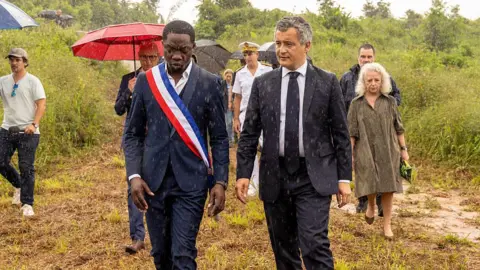**France to Open High-Security Prison in the Amazon Jungle**
In a significant move aimed at combating organized crime, French authorities have announced the construction of a high-security prison in the Amazon rainforest of French Guiana. The announcement was made by Gérald Darmanin, the French Minister of Justice, during his recent visit to the region. The facility, with an estimated construction cost of €400 million (approximately £337 million), is set to be located in an isolated area of Saint-Laurent-du-Maroni, a strategic point for drug trafficking activities emanating from nearby countries.
The decision to establish this prison comes in the wake of a series of violent incidents that have seen an alarming rise in attacks on prison facilities across France. In recent months, criminal gangs have targeted prisons and correctional staff, prompting the French government to take decisive action. The new prison is expected to accommodate up to 500 inmates, including a dedicated wing for housing the most dangerous offenders. It is designed specifically to disrupt the drug supply chain at every level, targeting both traffickers and radical elements within the criminal underworld.
**Strategic Objectives and Operational Framework**
Minister Darmanin emphasized the importance of implementing an “extremely strict carceral regime” within the prison aimed at incapacitating high-profile drug traffickers. The facility will not only serve as a place of detention but also aims to function as a critical tool for dismantling drug trafficking networks that operate out of mainland France. He indicated that the geographical isolation of French Guiana would significantly hinder the ability of organized crime figures to maintain contact with their criminal organizations. This claim is underpinned by the remote nature of the area, which contrasts sharply with prison facilities in metropolitan France, where communication and coordination among criminal elements have been a persistent issue.
French Guiana, an overseas department of France located on the northeastern coast of South America, offers unique logistical advantages for this strategic operation. Residents here are considered French citizens with full voting rights and access to the social security system. However, the prison’s construction is primarily focused on addressing the specific challenges posed by the geographical layout and the complexities of drug trafficking in the region.
**Increasing Security Measures Against Organized Crime**
The French government has long grappled with the issue of mobile phones infiltrating the prison system, a challenge that facilitates ongoing communication between inmates and their networks in the outside world. This high-security facility is expected to implement stringent measures to prevent such occurrences, adding another layer to France’s broader fight against organized crime, particularly drug-related offenses.
In addition to the prison in French Guiana, recent legislation has been enacted to tackle organized crime more effectively. This legislation includes the establishment of a specialized branch within the prosecutors’ office dedicated to organized crime, providing investigators with enhanced powers and protections for informants. The overarching goal is to create a fortified environment within the prison system to thwart the activities of powerful drug barons.
The urgency of this initiative is further accentuated by the rise in violent incidents surrounding prisons, which have been characterized by Darmanin as “terrorist acts.” Vehicles have been set ablaze outside prison gates, and gunfire has been directed at facilities, with some perpetrators claiming to champion prisoners’ rights.
**Historical Context and Future Prospects**
The proposed prison site in Saint-Laurent-du-Maroni is historically significant, being the former port of entry to the notorious Devil’s Island penal colony, which housed tens of thousands of convicts between the mid-nineteenth and mid-twentieth centuries. The stark history of this area, including its connection to literary works like Henri Charrière’s “Papillon,” adds an intricate layer to the ongoing narrative of crime and punishment in the region.
As France prepares to implement these significant security measures, the international community will be observing closely. The successful establishment and operation of this high-security prison could set a precedent for other nations grappling with similar issues involving organized crime and drug trafficking. The plan for the facility to be operational by 2028 indicates a long-term commitment to securing not just the French Guiana region but also contributing to efforts aimed at restoring safety and stability within the broader French penal system.
In conclusion, France’s initiative to establish a high-security prison deep within the Amazon jungle underscores the country’s proactive stance in addressing the intricate challenges posed by organized crime, particularly in relation to drug trafficking, and signals a significant development in their long-standing efforts to enhance public safety and security.



